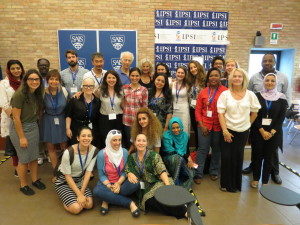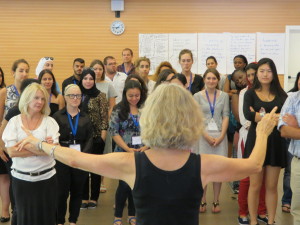by Carol Grojean, United States
Crossing the chasm of paradigm shifts can be tough for leaders. In conflict management, how can we help leaders move away from the model of aggression-to-violence-to-win or lose at the expense of the humanity? We are at a time when we have to ask the question – what is more important, humanity or sovereignty. Is the chasm we need to cross one of moving away from the position of self-interest towards a holistic, global-interest of all?
This week, at the Bologna Symposium on Conflict Prevention, Resolution and Reconciliation, John and Susan Marks came to talk with us about leadership in conflict. 32 years ago John and Susan started Search for Common Ground (https://www.sfcg.org/) which has grown today to be the world’s largest conflict prevention organization in over 34 countries around the world. The question they asked us, as have many other speakers during our first week, is what is needed of our world leaders – be those heads of states or children in the Congo – for us to cross this chasm towards a new way of living together in our global world?
Susan opened the session with beautiful Tibetan chimes, known as tingsha, which helped us to awaken our souls and reconnect with the self. A theme we continued throughout the day as we explored how person and role are two different things. The person, self, and who you are as a leader is independent from the role you occupy in your home, work, or other positions in society. Leadership, then, is knowing who you are and your impact on others while in those roles. Sadly, many people want to be good leaders but get caught up in role, and all that comes along with a roles authority, and lose their centered sense of self.
 John and Susan provided us with some good leadership guidance as we go about our journey:
John and Susan provided us with some good leadership guidance as we go about our journey:
1. Authentic Leadership – People will respect and trust who you are, not what you are.
2. Leadership for the Whole – Through your authentic self, build out that sacred trust amongst all.
3. Compassionate Leadership – Peace is not the absence of conflict but merely the absence of violence. We are all different people with different backgrounds who carry different stories, be curious and appreciative of the other.
4. Non-judgmental Leadership – Hold a position of none judgement when their views don’t fit your own.
If we all participate in this world with open minds and hearts, we can each participate in our individual way towards conflict prevention everywhere we go and together hold the possibility for an equal and just world for all. As Joseph Campbell put it, “The privilege of a lifetime is being who you are”.


